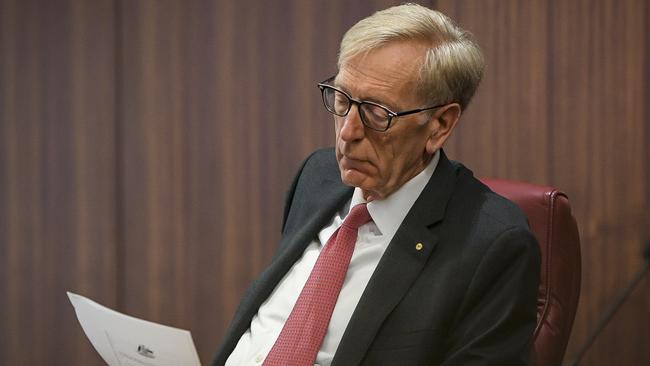Here’s hoping the Hayne royal commission’s final report will be an anticlimax
Whatever is in Kenneth Hayne’s final report, lots of his commission’s best work has already been done.

The banking royal commission has been such a valuably gruesome process that it is earnestly to be hoped that it isn’t messed up by a final report that overreaches.
That’s especially so since the report will be released in the febrile lead up to a federal election, when both sides of politics are likely to fall over themselves to promise to implement every word of it, before reading it.
It’s fair to say that much of what the final report can possibly contain is already being feverishly implemented by the banks and their regulators. Which is not to suggest that the report will be redundant, but simply that much of its impact has already happened.
The recommendations about the banking system will be written by an eminent lawyer, assisted by other lawyers, having spent 12 months hearing about misconduct, and nothing but misconduct. It is a Royal Commission into Misconduct in the Banking, Superannuation and Financial Services Industry, not another inquiry into the industry.
To say that his honour Kenneth Hayne and staff may have developed a jaundiced view of the industry must be an understatement. We all have. Only Macquarie Group and the industry funds have escaped unscathed, and they must still be high-fiving in disbelief.
The banks and AMP have been gutted, along with APRA and ASIC. Hapless junior executives, unhappy customers and finally CEOs and chairmen were put in the box and questioned, under oath, by well-briefed QCs, often hearing the dreaded words: “can I show you a document”, supported by the work of expert document system providers, Law in Order.
And as a result, it has been a media festival. There’s been nothing like it since the HIH Royal Commission of 2001, and that was relatively tame since it was about one company that had gone broke, so we already knew it was bad. This was about the badness of the longstanding pillars of the Australian financial services industry — all of them.
One journalist over the weekend wished it would it would just keep going, while another suggested it become an annual event, and who can blame them? Usually we spend our lives buried in spin from armies of PR people and smooth-talking CEOs. This year, for once, we were able to ride the coat-tails of expert, well-resourced questioners wielding the law of perjury.
It has been a truly amazing, wonderful show. Corruption has been exposed and boils have been lanced; comeuppances have been had and predecessors thrown under buses.
The only question remaining is: what now? What will Mr Hayne recommend in February? Incremental improvements in regulation? Or a radical restructuring of the industry?
I have been opening a random sample of the 10,140 submissions — just short ones from individuals. Without exception they called for the banks to be broken up and most of them, surprisingly, used the term “Glass Steagall” – suggesting that the now-repealed American law that used to forcibly separate banking from insurance and investment banking be introduced into Australia.
That would certainly be a fertile field for the royal commissioner to plough, although most of the banks have already announced plans to break themselves up along those lines so perhaps such a recommendation would lack drama.
But Westpac says it will keep its insurance and wealth management division and AMP and Macquarie have not announced any plans to get rid of their banks, so an Australian version of Glass Steagall would make it uniform and would make sure they didn’t slide back into their bad old “one stop shop” ways in future.
Perhaps My Hayne will recommend a system of “spot checks” of bank cultures, along the lines of Health Department spot checks of restaurants for cockroaches or random breath tests of drivers.
How these might proceed is hard to say and it’s here we start to get into what might be called overreach.
I don’t know whether the extra regulation to be recommended by Mr Hayne will extend to spot culture checks, but it must be tempting, given how hopeless APRA and ASIC have been at keeping an eye on this in the past.
Certainly in his recommendations Mr Hayne can be expected to tell the regulators how to do their job, as he should, and he will probably tell the bank directors how to do theirs as well. And since Mr Hayne is a lawyer, that won’t involve telling them to get out there and make more money. Oh no. It will more likely involve increasing the mound of board papers.
I had dinner during the week with the CEO of a top 100 company and, late in the evening, the subject of the royal commission came up. He said he meets regularly with a group of other CEOs to compare notes, and all of them report that their boards have undergone a marked transformation over the past few months.
This CEO’s board papers were now up to 600 pages for a two-day meeting; others were reporting something similar.
Australian company directors in all industries have become obsessively compliance focused in 2018 as a direct result of the royal commission into misconduct in financial services.
“There but for the grace of compliance go I”, seems to be the thinking. No doubt the sight of Catherine Livingstone and Ken Henry sweating in the box under oath will have that effect.
So after the drama we’ve seen this year, I’m rather hoping the final report is an anticlimax.
Alan Kohler is Business Editor at Large of The Australian and Editor in Chief of Investsmart Group.



To join the conversation, please log in. Don't have an account? Register
Join the conversation, you are commenting as Logout